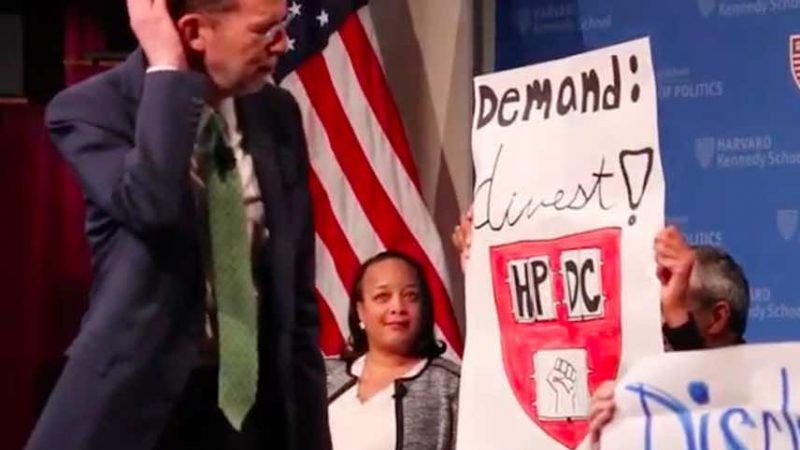Harvard President Lawrence Bacow to Activist Students Who Shut Down His Talk: 'The Heckler's Veto Has No Place' Here
"Everyone who has been invited to speak at Harvard in recent memory-has been able to do so."

Last week, activist students at Harvard University rushed the stage to prevent President Lawrence Bacow from speaking at a Kennedy Center event. They did so in support of divesting the university's $400 million budget from fossil fuels and for-profit prisons.
Administrators implored the 30 protesters to leave the stage and continue their activism toward the back of the John F. Kennedy Jr. Forum so that the event could proceed. They refused, shouting, "If we don't get it, shut it down," a common activist refrain.
Eventually, Bacow eventually gave up, and some members of the audience followed him to a classroom for a discussion.
On Wednesday, Bacow published an op-ed in The Harvard Crimson condemning the activists' tactics. "To my knowledge, everyone ever invited to speak at the Forum—indeed, everyone who has been invited to speak at Harvard in recent memory—has been able to do so," he writes. "That is no longer the case as of last Thursday."
What I saw last week was not a group of students looking to engage in conversation about things that matter to them. It was, instead, an effort to obstruct the rights of others to speak and to listen. A university committed to truth cannot function if some members of our community shout down others. Our University-Wide Statement on Rights and Responsibilities makes clear the right to protest and dissent, but it makes equally clear that this right may not be exercised in a way that interferes with values that are essential to the nature of our enterprise, among them the freedom to exchange ideas.
The heckler's veto has no place at Harvard. When we shut down conversation, when we shut down debate, we shut down the opportunity to learn through reasoned discourse. It would be a shame if the state of our national public discourse, which has become so coarse, becomes the state of our campus discourse as well. We should strive to model the behavior we would hope to see in the rest of the world. Now is the time to ask ourselves: What kind of community do we want to be?
In a recent essay for RealClearEducation, I argue that while there is no free speech "crisis" on college campuses, there is certainly a problem:
Irrespective of the polling, most students are not inclined to take steps to censor a visiting speaker, or retaliate against a professor who offended them. But many campuses possess a small number of extremely far-left students who view speech that discomforts them as a threat to their mental well-being, and ultimately their physical safety. When these students take matters into their own hands, the rest of campus—other students, faculty, and administrators—often have no idea what to do. Many disagree with the mob, but do not wish to become their next target. Indeed, professors routinely tell me that they are afraid of provoking their most liberal students….
It would be wrong to succumb to generational fatalism: As a whole, the "kids these days" probably aren't significantly less enthusiastic about the First Amendment. But there's more than enough reason to be concerned that an anti-speech minority is getting its way, and the majority isn't sure what to do about it. For all those who want college campuses to remain places where controversial speech is welcome, something's gotta give.
Consider Bacow's testimony as yet more evidence that something has gone wrong on elite college campuses.

Show Comments (43)